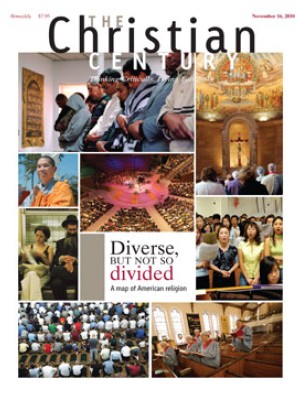Gays tell bullied teens ‘It gets better’; clergy decry ‘religious’ attacks
A Catholic writer in upstate New York, a Muslim college student from Connecticut and an ex-Mormon attorney in the San Francisco Bay Area have joined a chorus of testimonials on YouTube aimed at preventing teen suicides.
Even if your faith and your family believe that gay people are an abomination, even if they think you're going to hell, the videos plead, hang in there: It gets better.
Advice columnist Dan Savage launched the It Gets Better Project by uploading a video with his husband, Terry Miller, in response to the recent deaths of Tyler Clementi, 18; Billy Lucas, 15; Asher Brown, 13; and Seth Walsh, 13.
The words of encouragement came as an alliance of high-level Christian leaders and other clergy released a statement October 18 urging people of faith to work toward ending hatred and violence against gay youth—"bullying" that has led some to commit suicide. Signers of the Clergy Against Bullying statement said, among other things, that "given the recent outburst of antigay rhetoric and action, the church must not be silent."
As for its part, the YouTube channel amassed in one month more than 800 videos viewed more than a million times. These have been submitted by a range of gay, straight, celebrity and anonymous participants.
Openly gay Episcopal bishop V. Gene Robinson of New Hampshire uploaded his own video, reaching out specifically to Catholic, Mormon and evangelical youths and saying their churches are "flat out wrong" on the question of homosexuality.
"God loves you the way you are and God doesn't want you to change. God doesn't want you to be cured or healed, because there's nothing to be healed from," Robinson says in the video. "You're the way you are, the way God made you and the way God loves you."
Read our latest issue or browse back issues.
In "Gay Catholic Author Says It Gets Better," Gregory Gerard describes how he grew from a suicidal 23-year-old to "a gay guy in my forties who has a husband and a house and a dog, and we had a union ceremony that my whole family came to."
Raised in a Mormon household in Utah, Natalie Sperry, 34, describes her anguish when her mother forced her to move out after discovering diary entries about her high school girlfriend. Now an attorney in California and resigned from church membership rolls, she hopes her video, "For LGBT Mormon Kids—It Gets Better," will comfort youths torn between their faith and feelings—"emotional extortion," she calls it—and the bullying some struggle to survive.
Sometimes it gets better within months rather than years. Speaking from his dorm room at New York University, Ibad Shah, 19, a lone Muslim contributor in the project's early weeks, described his eventual but unexpected relief after coming out to his Pakistani father, who had once threatened to "walk out" if any of his children turned out to be gay. His "It Gets Better—Muslim Gay Teen" video, which includes a liberal interpretation of Islamic and Judeo-Christian texts, has gotten mostly positive feedback—even from some traditional Muslims.
"Religious pressure makes up so much of the doubt and confusion and aggravation for a lot of young gay kids trying to come to terms with their sexualities," Shah said in an interview. "But even though [some Muslims] don't necessarily approve of my lifestyle, it's not their business how I live."
The National Council of Churches' general secretary, Michael Kinnamon, explaining why the NCC endorsed the antibullying statement, said that member denominations "are moved by scripture to affirm every person as a valued child of God. Just as we spoke out on behalf of Muslims who were subject to threats," Kinnamon said, "so we now stand as Clergy Against Bullying of our neighbors, regardless of sexual orientation and gender identity."
Signers included executives of the Episcopal Church, United Church of Christ, Presbyterian Church (U.S.A.) and Baptist pastor C. Welton Gaddy, president of the Interfaith Alliance. —RNS





